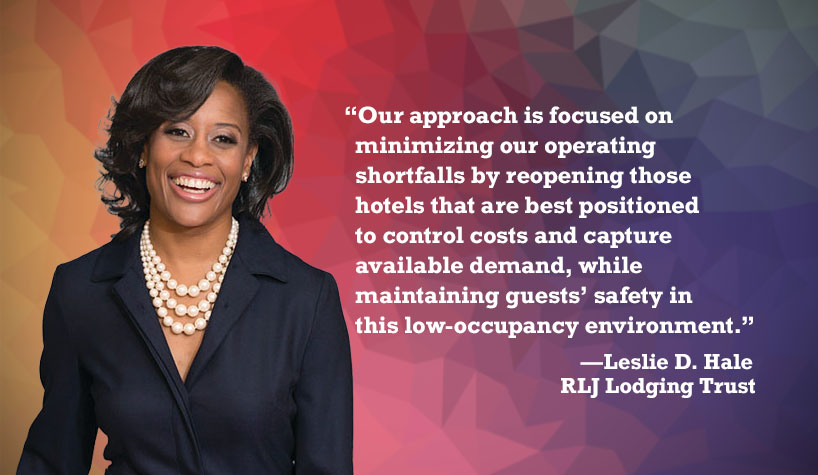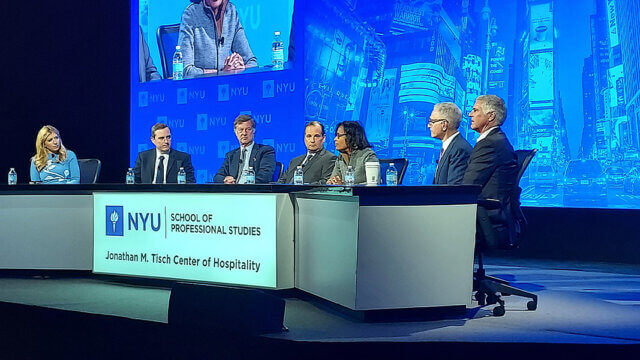BETHESDA, MD—RLJ Lodging Trust reported results for Q2 and said that following the plan it created to help in its reopening has helped it weather the storm that is the COVID-19 pandemic.
“As we outlined last quarter, we developed a thoughtful framework to reopen the 57 hotels that we previously suspended in a socially and financially responsible manner,” said Leslie D. Hale, president/CEO, RLJ Lodging Trust. “Our approach is focused on minimizing our operating shortfalls by reopening those hotels that are best positioned to control costs and capture available demand, while maintaining guests’ safety in this low-occupancy environment. The hotels that best fit this criteria are our select-service assets, all-suite hotels and hotels located in a resort or drive-to markets.”
Q2 Highlights
- Reopened 21 hotels during the second quarter and 15 hotels during the third quarter
- Successfully amended unsecured revolver and term loans to waive certain financial covenants
- Maintained a strong balance sheet with more than $1.0 billion of unrestricted cash
- Total revenue of $32.6 million
- Net loss of ($116.2) million
- Net loss per share of ($0.74)
- Adjusted EBITDA of ($50.5) million
Concurrent with its first quarter earnings release, the company suspended operations at 57 hotels in response to state-mandated stay-in-place orders and the significant reduction in demand due to the COVID-19 pandemic. As stay-in-place restrictions were lifted, the company developed a framework to open hotels in a socially and financially responsible manner. Based on this framework, the company reopened 21 hotels in the second quarter and 15 hotels during the third quarter. The reopened hotels are primarily transient-oriented, select-service and extended-stay hotels located in drive-to and leisure markets. The company continues to evaluate reopening additional hotels based on market conditions.
Currently, 82 of the company’s 103 hotels are open. All open hotels continue to operate under aggressive operating cost containment plans, including significantly reduced staffing, elimination of nonessential amenities and services, and the closure of several floors and most food and beverage outlets.
The company is updating its prior estimate of monthly cash burn for the period from April to December 2020. The company’s monthly cash burn during the second quarter was lower than expectations as hotel operating shortfalls were lower due to higher revenues at hotels that were open for the entire quarter, primarily driven by the lift in leisure demand; incremental revenues from reopening more hotels during the second quarter than previously expected; and, greater cost savings from successful cost containment initiatives. These factors resulted in second quarter average hotel monthly operating shortfalls to be 40% below the company’s prior estimates.
Based on the success in reducing the burn rate during the second quarter, the company now estimates that average monthly cash burn across its portfolio will be approximately $25 million to $30 million (excluding capital investments), representing a $5.0 million reduction to the high end of the prior range and a $2.5 million reduction to the mid-point of the prior range. The current cash burn range is based on the following assumptions:
- Average hotel-level monthly operating shortfalls of approximately $5 million to $9 million
- Average hotel fixed costs of $7 million, which includes property taxes and insurance
- Corporate-level monthly general and administrative cash expenses of $2 million
- Corporate-level outflows of $11 million to $12 million, which includes interest and scheduled principal payments on the company’s outstanding debt, as well as both common and preferred dividends
The actual monthly cash burn will vary based on the level of lodging demand. The monthly cash burn is expected to be at the low end of the range if lodging demand remains at current levels and the high end of the range if lodging demand contracts from current levels. Management continues to believe that its current liquidity has positioned the company to withstand a protracted period of limited hotel demand.



